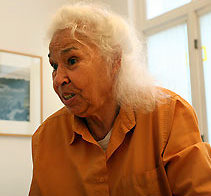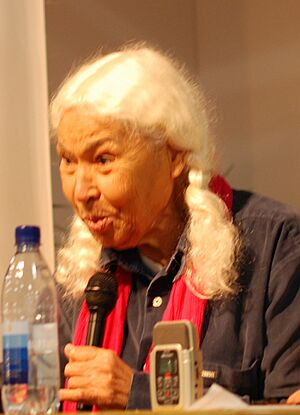Nawal El Saadawi facts for kids
Quick facts for kids
Nawal El Saadawi
|
|
|---|---|
| نوال السعداوي | |

Saadawi in 2008
|
|
| Born | 22 October 1931 Kafr Tahla, Egypt
|
| Died | 21 March 2021 (aged 89) Cairo, Egypt
|
| Other names | Nawal Zeinab el Sayed |
| Alma mater | Cairo University Columbia University |
| Occupation | Physician, psychiatrist, author |
| Spouse(s) |
Ahmed Helmi
(m. 1955; div. 1957)Rashad Bey
(divorced)Sherif Hatata
(m. 1964; div. 2010) |
| Children | 2 |
Nawal El Saadawi (born October 22, 1931 – died March 21, 2021) was an Egyptian doctor, writer, and activist. She was a strong supporter of women's rights. Many people called her "the Simone de Beauvoir of the Arab World". She was also known as "Egypt's most radical woman".
Nawal El Saadawi started the Arab Women's Solidarity Association. She also helped create the Arab Association for Human Rights. She received special awards and degrees from universities around the world. In 2004, she won the North–South Prize. In 2005, she won the Inana International Prize. In 2012, she received the Seán MacBride Peace Prize.
Contents
Growing Up in Egypt
Nawal El Saadawi was born on October 22, 1931. She grew up in a small village called Kafr Tahla in Egypt. She was the second oldest of nine children. Her parents were quite open-minded for their time.
Her father worked for the government. He spoke out against the British control of Egypt in 1919. Because of this, he was sent away to a small town. He was not promoted at work for 10 years. He taught Nawal to respect herself and to speak her mind. He also encouraged her to study Arabic. When Nawal was 10, her family tried to arrange a marriage for her. But her mother helped her say no. Both her parents passed away when she was young. This meant Nawal had to help support her large family.
Nawal's mother came from a wealthy family. Even as a child, Nawal did not like how society favored boys over girls. She got angry when her grandmother said, "a boy is worth 15 girls at least... Girls are a blight." Nawal was proud to be a dark-skinned Egyptian woman.
Her Work as a Doctor and Writer
Nawal El Saadawi became a medical doctor in 1955. She graduated from Cairo University. That same year, she married Ahmed Helmi, a fellow medical student. They had a daughter named Mona Helmi. Their marriage ended after two years.
As a doctor, she saw many health problems in women. She realized these problems were often linked to unfair cultural practices. She saw how women were treated unfairly because of their gender, social class, or country's history. Her second husband was a doctor named Rashad Bey.
While working as a doctor in her home village, she saw the difficulties women in the countryside faced. She tried to help a patient who was being harmed at home. Because of this, Nawal was called back to Cairo. She later became a director in the Ministry of Public Health. There, she met her third husband, Sherif Hatata. He was also a doctor and writer. They married in 1964 and had a son. Nawal and Sherif were together for 43 years. They divorced in 2010.
Nawal El Saadawi studied at Columbia University. She earned a master's degree in public health in 1966. In 1972, she published a book called Woman and ... (المرأة والجنس). This book talked about the harm done to women's bodies. It became a very important book for the second-wave feminism movement. Because of this book and her activism, she lost her job at the Ministry of Health. She also lost her roles as chief editor of a health magazine and as a leader in the Medical Association in Egypt.
From 1973 to 1976, Nawal researched women's mental health at Ain Shams University. From 1979 to 1980, she advised the United Nations on women's programs in Africa and the Middle East.
Challenges and Imprisonment
Nawal El Saadawi was often seen as controversial by the Egyptian government. In 1981, she helped publish a feminist magazine called Confrontation. In September, President of Egypt Anwar Sadat had her put in prison. Nawal said she was arrested because she believed Sadat when he said Egypt had democracy and people could criticize. She started criticizing his policies and ended up in jail.
Even in prison, she kept fighting for women's rights. She started the Arab Women's Solidarity Association. This was the first legal and independent group for women's rights in Egypt. In prison, she was not allowed paper or pens. But she still wrote her thoughts using an eyebrow pencil and toilet paper. She was released later that year, after the President was killed. She wrote about her experience: "Danger has been a part of my life ever since I picked up a pen and wrote. Nothing is more perilous than truth in a world that lies."
Her time in prison led to her 1983 book, Memoirs from the Women's Prison (Arabic: مذكرات في سجن النساء). Before this, she met a prisoner who inspired her novel Woman at Point Zero (Arabic: امرأة عند نقطة الصفر, 1975).
Later Activism and Teaching
In 1993, Nawal El Saadawi faced threats and political problems. She had to leave Egypt. She taught at Duke University and the University of Washington in the United States. She also taught at other famous universities like Cairo University, Harvard, Yale, Columbia, and University of California, Berkeley. In 1996, she moved back to Egypt.
Nawal continued her activism. She considered running in the 2005 Egyptian presidential election. But she decided not to because of strict rules for new candidates. She was among the people protesting in Tahrir Square in 2011. She believed that religious teaching should be removed from Egyptian schools.
In July 2016, she spoke at a literary festival in London. She talked about being a woman writer. At the Göteborg Book Fair in 2018, Nawal El Saadawi said that powerful global countries, led by the United States, worked with the Egyptian government to stop the 2011 Egyptian revolution.
Nawal El Saadawi held many important positions. She was a writer for the Supreme Council for Arts and Social Sciences in Cairo. She was also a Director General in the Ministry of Health. She was a leader in the Medical Association. She started the Health Education Association and the Egyptian Women Writers' Association. She was also the chief editor of Health Magazine.
Her Writings
Nawal El Saadawi started writing early in her career. Her first short stories were called I Learned Love (1957). Her first novel was Memoirs of a Woman Doctor (1958). She wrote many novels, short stories, and a personal memoir. Her books have been translated from Arabic into more than 30 languages.
In 1972, she published her first non-fiction book, Women and .... This book made some powerful political and religious leaders angry. It also led to her losing her job. Other important books include The Hidden Face of Eve, God Dies by the Nile, and Woman at Point Zero.
Some people criticized her book The Hidden Face of Eve. They said she was writing for people outside the Arab world. The original Arabic title meant "The Naked Face of the Arab Woman". Some parts of the book were removed from the English version.
She also wrote for important collections of writings. Her essay "About Me in Africa—Politics and Religion in my Childhood" was in the 2019 book New Daughters of Africa.
Nawal El Saadawi spoke fluent English. She wrote her books in Arabic. She felt that translating her work into English or French was a "big problem". She believed that powerful countries, which mostly speak English or French, often ignored her work. This was because she wrote in Arabic and criticized their way of thinking.
Her book Mufakirat Tifla fi Al-Khamisa wa Al-Thamaneen (A Notebook of an 85-year-old Girl) was published in 2017. It was based on her personal journal.
Film About Her Life
A film about Nawal El Saadawi called She Spoke the Unspeakable was released in 2017. It was directed by Jill Nicholls and shown on BBC One's Imagine series.
Her Passing
Nawal El Saadawi passed away on March 21, 2021, in a hospital in Cairo. She was 89 years old. Her life was remembered on BBC Radio 4's program Last Word.
Awards and Recognition
- 2004: North–South Prize from the Council of Europe
- 2005: Inana International Prize, Belgium
- 2007: Honorary Doctorate, Vrije Universiteit Brussel, Belgium
- 2007: Honorary Doctorate, Université libre de Bruxelles, Belgium
- 2010: Honorary Doctorate, National Autonomous University of Mexico, Mexico
- 2011: Stig Dagerman Prize
- 2012: Seán MacBride Peace Prize
- 2015: BBC's 100 Women
- 2020: Time's 100 Women of the Year (1981)
Selected Books
Nawal El Saadawi wrote many books. Some of her works are available online.
Novels
- Memoirs of a Woman Doctor (1958)
- Searching (1965)
- Two Women in One (1968)
- God Dies by the Nile (1974)
- The Circling Song (1977)
- Woman at Point Zero (1977)
- The Fall of the Imam (1987)
- Love in the Kingdom of Oil (1993)
- Zeina (2009)
Short Story Collections
- I Learned Love (1957)
- Moment of Truth (1959)
- Little Tenderness (1960)
- She Has No Place in Paradise (1979)
Plays
- Twelve Women in a Cell (1984)
- Isis (1985)
Memoirs
- Memoirs from the Women's Prison (1983)
- My Travels Around the World (1986)
- A Daughter of Isis (1995)
- Walking Through Fire (1998)
Non-fiction
- Women and ... (1969)
- The Hidden Face of Eve: Women in the Arab World (1977)
Images for kids
See Also
 In Spanish: Nawal El Saadawi para niños
In Spanish: Nawal El Saadawi para niños
- List of Egyptian authors
- Feminism in Egypt
- Islamic literature
 | Misty Copeland |
 | Raven Wilkinson |
 | Debra Austin |
 | Aesha Ash |



